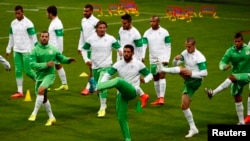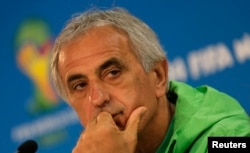Never mind the guys on the opposing team: Some Muslim athletes heading into World Cup play face heady internal competition between the rigors of fasting and football.
Saturday marked the start of Ramadan, the Islamic month of contemplation, prayer and fasting. While there are exemptions – for infirmity, advanced age or physically demanding jobs – most devout Muslims refrain from eating or drinking anything from sunrise to sunset.
For athletes, that can be a challenge. Even the slightest advantage can influence the outcome of a game, a consideration likely to draw special attention in this afternoon’s match between Algeria and Germany. It will start less than an hour before sunset in Porto Alegre, Brazil.
An Algerian football newspaper recently reported that Algeria’s head coach, Vahid Halilhodzic, forbade his players against fasting – a charge he and the national football association denied, according to the Associated Press. Algeria is predominantly Muslim, and its team is exclusively so.
Halilhodzic, a French-Bosnian who has coached the team for three years, said at a news conference Sunday that players could decide for themselves whether to fast.
The coach objected to questions on the topic, calling fasting "a private issue" on which "players will do exactly as they wish," the AP said.
Impact of fasting studied
This year’s World Cup is the first to overlap with Ramadan in 28 years. So, well in advance, commissioners for World Cup organizer FIFA ordered up several studies on fasting, The New York Times reported.
The Times quoted the chairman of FIFA’s medical committee, Dr. Michael D’Hooghe, as saying that if fasting is done "intelligently, then then you can adapt perfectly. Before the sun comes up, they [athletes must] have enough hydration to go on through the whole day."
A nutrition expert at Tufts University in Boston, Massachusetts, talked with VOA about the physiological challenges of fasting.
Jennifer Sacheck, an associate professor at Tufts University’s Friedman School of Nutrition Science and Policy, explained that fasting lowers the body’s storage of carbohydrates. That can reduce blood sugar levels, which can negatively affect mental sharpness and muscle contraction.
In essence, the athlete’s brain competes with brawn.
Carbohydrates also help the body with hydration, Sacheck said, because they bind with water. If athletes “aren’t taking in carbohydrates, it’s harder to retain fluids,” she said.
Fluid needs
Restricting fluids further compromises the body, slowing delivery of oxygen and other nutrients to the muscles, Sacheck added. The blood thickens, forcing the heart to work harder.
"Any athlete that loses 2 to 3 percent of [his] body weight by sweating will have compromised performance," she said.
A change in eating habits – ingesting most calories at night – also can negatively affect the body, Sacheck said. "You’d have to get used to getting a lot of calories during the night, which also brings in the issue of sleep , so [digestion] doesn’t mess with your sleep-wake cycles."
However, Sacheck noted that high-level training means "athletes have learned to thermo-regulate better under different environmental conditions."
And, at least during the match, they can feed on the enthusiasm of their fans.





